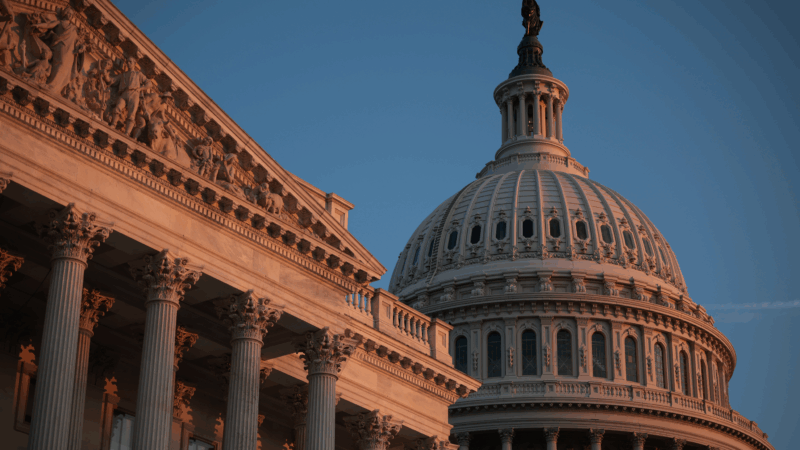Trump’s bill advances in rare weekend vote as House conservatives negotiate changes
WASHINGTON — Republicans advanced their massive tax cut and border security package out of a key House committee during a rare Sunday night vote as deficit hawks who had blocked the measure two days earlier allowed it to move forward, citing what they called progress in negotiations on the package’s spending cuts.
Speaker Mike Johnson met with Republican lawmakers shortly before the meeting and told reporters that some changes had been agreed to, but he did not offer specifics. He described them as “just some minor modifications. Not a huge thing.”
Democrats on the panel pressed for more details. But Rep. Jodey Arrington, the chairman of the House Budget Committee, said the bill remained under negotiation.
“Deliberations continue at this very moment,” Arrington said. “They will continue on into the week, and I suspect right up until the time we put this big, beautiful bill on the floor of the House.”
The four conservatives who have been voicing concerns about the bill’s impact on the deficit voted present so that the measure could advance by a vote of 17-16.
More talks are ahead, but Johnson is looking to put the bill on the House floor before the end of the week.
“This is the vehicle through which we will deliver on the mandate that the American people gave us in the last election,” he said on “Fox News Sunday.”
The first time that Republicans tried advancing the bill out of the House Budget Committee last week, the deficit hawks joined with Democratic lawmakers in voting against reporting the measure to the full House.
The Republicans criticizing the measure noted that the bill’s new spending and the tax cuts are front-loaded in the bill, while the measures to offset the cost are back-loaded. They are looking to speed up the new work requirements that Republicans want to enact for able-bodied participants in Medicaid. Those requirements would not kick in until 2029 under the current bill.
“We are writing checks we cannot cash, and our children are going to pay the price,” said Rep. Chip Roy, R-Texas, a member of the committee. “Something needs to change, or you’re not going to get my support.”
Johnson said the start date for the work requirements was designed to give states time to “retool their systems” and to “make sure that all the new laws and all the new safeguards that we’re placing can actually be enforced.”
Roy had been joined Friday in voting no by Reps. Ralph Norman of South Carolina, Josh Brecheen of Oklahoma and Rep. Andrew Clyde of Georgia. Rep. Lloyd Smucker of Pennsylvania switched his vote to no in a procedural step so it could be reconsidered later.
After Sunday’s vote, Roy tweeted on X that the bill will “move Medicaid work requirements forward and reduces the availability of future subsidies under the green new scam,” a reference to the green energy tax breaks from the Inflation Reduction Act. But he also warned that more changes were needed and “the bill does not yet meet the moment.”
Norman pointed to a recent downgrade of the nation’s credit rating in making his arguments for steeper reductions.
“We’ve got a lot more work to do,” Norman said. “We’re excited about what we did. We want to move the bill forward.”
At its core, the sprawling legislative package permanently extends the existing income tax cuts that were approved during Trump’s first term, in 2017 and adds temporary new ones that the president campaigned on in 2024, including no taxes on tips, overtime pay and auto loan interest payments. The measure also proposes big spending increases for border security and defense.
The Committee for a Responsible Federal Budget, a nonpartisan fiscal watchdog group, estimates that the House bill is shaping up to add roughly $3.3 trillion to the debt over the next decade.
Democrats are overwhelmingly opposed to the measure, which Republicans have labeled “The One, Big, Beautiful Bill Act.” Rep. Pramila Jayapal, D-Wash., called it, “one big, beautiful betrayal” in Friday’s hearing.
“This spending bill is terrible, and I think the American people know that,” Rep. Jim Clyburn, D-S.C., told CNN’s “State of the Union” on Sunday. “There is nothing wrong with us bringing the government in balance. But there is a problem when that balance comes on the back of working men and women. And that’s what is happening here.”
Johnson is not just having to address the concerns of the deficit hawks in his party. He’s also facing pressure from centrists who will be warily eyeing the proposed changes to Medicaid, food assistance programs and the rolling back of clean energy tax credits. Republican lawmakers from New York and elsewhere are also demanding a much large state and local tax deduction.
As it stands, the bill proposes tripling what’s currently a $10,000 cap on the state and local tax deduction, increasing it to $30,000 for joint filers with incomes up to $400,000 a year.
Rep. Nick LaLota, one of the New York lawmakers leading the effort to lift the cap, said they have proposed a deduction of $62,000 for single filers and $124,000 for joint filers.
If the bill passes the House this week, it would then move to the Senate, where Republican lawmakers are also eyeing changes that could make final passage in the House more difficult.
Johnson said: “The package that we send over there will be one that was very carefully negotiated and delicately balanced, and we hope that they don’t make many modifications to it because that will ensure its passage quickly.”
Team USA faces tough Canadian squad in Olympic gold medal hockey game
In the first Olympics with stars of the NHL competing in over a decade, a talent-packed Team USA faces a tough test against Canada.
PHOTOS: Your car has a lot to say about who you are
Photographer Martin Roemer visited 22 countries — from the U.S. to Senegal to India — to show how our identities are connected to our mode of transportation.
Looking for life purpose? Start with building social ties
Research shows that having a sense of purpose can lower stress levels and boost our mental health. Finding meaning may not have to be an ambitious project.
Sunday Puzzle: TransformeR
NPR's Ayesha Rascoe plays the puzzle with listener Joan Suits and Weekend Edition Puzzlemaster Will Shortz.
Danish military evacuates US submariner who needed urgent medical care off Greenland
Denmark's military says its arctic command forces evacuated a crew member of a U.S. submarine off the coast of Greenland for urgent medical treatment.
Only a fraction of House seats are competitive. Redistricting is driving that lower
Primary voters in a small number of districts play an outsized role in deciding who wins Congress. The Trump-initiated mid-decade redistricting is driving that number of competitive seats even lower.






